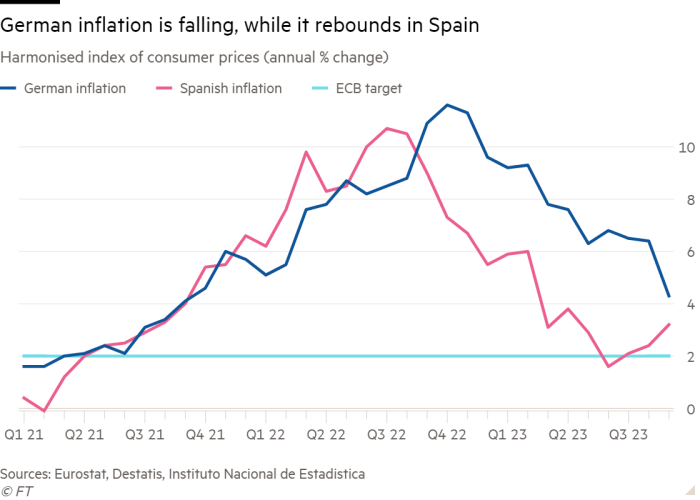Obtain free German economic system updates
We’ll ship you a myFT Each day Digest e-mail rounding up the newest German economic system information each morning.
German inflation has dropped to its lowest degree for 2 years, boosting hopes that the European Central Financial institution has reached the top of its rate-rising cycle.
The harmonised index of client costs in Germany fell from 6.4 per cent in August to 4.3 per cent in September, the slowest annual value progress within the nation since September 2021. Economists polled by Reuters had forecast a price of 4.5 per cent.
Coupled with decrease than anticipated inflation in Spain, the place client costs rose 3.2 per cent in September, slowing German value progress added to expectations that the ECB will now depart the eurozone’s benchmark rate of interest on maintain at 4 per cent for a while.
Inflation throughout the 20-country bloc is predicted to fall from 5.2 per cent in August to virtually a two-year low of 4.5 per cent when that determine is launched on Friday.
German inflation is predicted to proceed falling, hitting 3 per cent by the top of the 12 months, based on economists at Dutch financial institution ING and consultants Pantheon Macroeconomics.
Nevertheless, hovering oil costs and fast wage progress are including to investors’ worries that inflation will stay persistently above the ECB’s 2 per cent goal and power it to maintain rates of interest greater for longer.
Brent crude jumped practically 3 per cent on Wednesday to a 10-month excessive of greater than $97 a barrel. German wages rose at a report annual tempo of 6.6 per cent within the second quarter, based on official knowledge revealed final month.

Inflation fell sharply in German transport providers and power in September on account of final 12 months’s subsidised €9 month-to-month journey ticket and gasoline reductions dropping out of the annual comparability from this month.
In comparison with the earlier month, client costs rose 0.2 per cent, a slowdown from a month-to-month tempo of 0.4 per cent in August.
After stripping out meals and power, German inflation fell from 5.5 per cent in August to 4.6 per cent.
Power inflation within the nation fell from 8.3 per cent to 1 per cent, whereas providers inflation dropped from 5.1 per cent to 4 per cent, and meals inflation slowed from 9 per cent to 7.5 per cent. Items inflation got here down from 7.1 per cent to five per cent.
One worrying signal for central bankers is that buyers’ value expectations over the subsequent 12 months rose for the second consecutive month within the eurozone, based on a month-to-month Europe Fee survey revealed on Thursday. Nevertheless it additionally discovered that fewer providers and retail firms anticipated to extend their costs.